- Home
- Hambly, Barbara
Icefalcon's Quest (Darwath) Page 13
Icefalcon's Quest (Darwath) Read online
Page 13
“You go quick, now.” Hethya unknotted the rope that pinched agonizingly around Tir’s wrists. “He’s looking into that crystal of his, so he’ll be busy awhile. Don’t go far.”
“I won’t.” Tir was sufficiently grateful that this woman let him go into the woods alone to relieve himself, instead of taking him on a rope as Bektis did, that he wouldn’t have gotten her into trouble by running away. Besides, he knew perfectly well there was nowhere to go. He might only be seven years old, but he knew he could not survive alone in the badlands. Whatever was happening, he was safer with Bektis—which, as Rudy would say, was a pretty scary mess to be in.
He could not rid his mind of the image of Rudy being struck by Bektis’ lightning, buckling slowly forward over the cliff, falling into whirling darkness. Beside Hethya’s soft-breathing warmth at night he saw it over and over again, as if it were caught like the images in Gil’s record crystals, repeating itself exactly the way it had happened for all eternity. He wanted Rudy and he wanted his mother and he wanted his friends and his home, and he knew that he might never, ever see any of them again.
He knew not to go far into the woods. Hethya was watching him—turning around he could see her broad face, her rough rusty curls and the topaz-and-snuff patterns of her quilted jacket—but he knew, too, that if any trouble arose, like the White Raiders who’d attacked them the day before yesterday, that she was too far off to help. From Tir’s earliest memories there had been bandits, dire wolves, saber-teeth, and sometimes even White Raiders in the Vale of Renweth, in spite of all the patrols by Janus and the Guards. He had a healthy respect for the green-on-green isolation among the cottonwoods, boulders, and fern.
He was coming back toward camp when he found one of the Akulae dead.
The man lay on his side at the bottom of a little slope, in a nest of fern and wild grape. Tir could see no blood. It wasn’t the man who’d been wounded in the fight, but Tir didn’t know which of the other two it was. His white-stubbled face, half turned up toward the dapple shade of elms and cottonwoods, was calm, stoic, and a little stupid, as it had been in life.
Tir looked around quickly. There was no danger in sight. (“It isn’t the saber-tooth you see that kills you,” the Icefalcon would have pointed out.) Taking a deep breath, the boy scrambled down the clayey slope. Closer to, the body smelled of death, but not of blood. It smelled of something else, too, an ugly decay Tir couldn’t recognize or define.
What if the Akula had died of the plague? Gil and Rudy and Ingold all said plague got spread by bugs too tiny to see. What if they were all over this body just waiting to jump off like fleas and onto him?
But at the same time he thought this, he was looking around, pulling a handful of big leaves off the wild-grape vine—from underneath where it wouldn’t show—to shield his hands. He unbuckled the dead man’s belt and pulled his dagger free, sheath and all. The leaves were awkward, and he threw them away—if he dropped dead of the plague, he thought, it couldn’t be any worse than what might happen to him if he didn’t have a weapon in an emergency.
He buckled the belt on the dead man again, and with some difficulty worked the dagger down into his own boot, on the inside of his leg, and pulled his trouser over to cover the hilt. There wasn’t time for more. Hethya would be watching for him the moment his head disappeared from the bushes. He scrambled fast up the bank again, calling out, “Hethya! Hethya!”
He remembered to sound scared, so they wouldn’t think he’d gone down to the body.
She appeared at the top of the bank and held out her hand for him, big and strong and warm. He pointed down the bank. It wasn’t hard to fake fear; he was trembling all over and could hardly breathe, but he managed to say, “He’s dead!”
Then Hethya did a strange thing.
She clicked her tongue—“Tsk!”—and shook her head a little and took his hand. “Let’s get back to camp, sweetheart.”
And that was all.
The Icefalcon crouched near the cave’s entrance under the chokecherry bushes—it was too low to stand straight—while his sister marked out the four corners of the narrow place with guardian wards, then knelt to burn a pinch of the powder of dried olive leaves on which certain marks had been made to cleanse the air. Ideally, when a scout undertook to shadow-walk—as scouts did occasionally in war, when the other family or band had a particularly powerful Wise One in their midst—he or she would lie on earth and under open sky, where neither the demons of the air nor the elementals that imbued the ground could dominate. Given Cold Death’s strength as a shaman the Icefalcon did not doubt that he would be safe from elementals. Still, the damp place, closed in, green-dim, smelling of earth and foxes, made him uneasy.
The Icefalcon had never shadow-walked. It was not considered safe for boys to make the venture before they reached full manhood, and he had left the Talking Stars People in his seventeenth year. He had seen it done only twice before in his life, when the Talking Stars People had been at war with Black Pig’s family of the Salt People.
On the first occasion, the shadow scout had returned safely, with information about the layout of Black Pig’s summer hold in the Cruel River Country that could not be ascertained by ordinary observation.
The second time, six or seven years later during another war, the scout’s friends—it was the same man who had gone before, who had experience—and Cold Death had waited by the body through three nights and two days, Cold Death weaving such spells as would draw back the scout’s spirit to the empty and silent flesh. After that the tribe had had to move on for fear of being raided by Black Pig. The next time the Talking Stars People had camped in that place Cold Death and the Icefalcon—who was sixteen then—and three or four of the scout’s friends returned to the place where the body had lain and seen a few of the man’s bones. What became of his spirit they never knew.
Thus it was with a certain degree of trepidation that the Icefalcon lay himself down between the four cold balls of spirit-fire that Cold Death summoned from the air and watched her drawing out Circles around him. There was a Circle of Protection, to keep at bay the elementals and the demons that would have taken over his still-living body once his spirit was no longer in residence. “You have to watch out for them while you’re walking,” Cold Death said, once she had completed the marks and stood wiping ocher and blood from her fingertips. “They’ll try to distract you, to get you lost once you’re out there. They feed on fear and pain.”
There was a Circle of Ancestors. “Do our Ancestors actually guard us when they are summoned to a Circle?” He was drowsy now with the growing effect of the spell and with the warmth of the heat-spells she’d called to keep his body from dying in its sleep. He and Cold Death had watched by turns through the previous night, and neither had slept after midnight.
“I’ve never seen them.” She leaned over him to paint the first lines of the Circle of Power across his face, his hands, his breast under the wolf-hide tunic, in a paste of mud and powdered wildcat blood. She wove his name into them, and the image of the pilgrim-bird that dwells in the high cliffs near the glaciers, overlaid with sigils of protection. These signs were repeated, over and over, in the lines that spiraled out from him to form the anchoring power-curves of the Circle, running up the wall and, it seemed to him in his half-dreaming state, away into the earth around him, like shining roots.
The sharp air from the cave’s low opening filled the tiny space with fog, through which the wan blue spirit-fires glowed like tiny suns on a day drowned in mist. Sleepiness closed over his mind.
“You’ll want to stop and look at everything.” Her fingertip was cold over his hands. “Don’t. You’re vulnerable to everything—demons, elementals, rain, wind. The sight of the sun itself. If you get lost, you’ll never find your way back. Look for the ground first. Don’t forget to watch your back trail.”
Back trail, he thought dreamily. Like tracking in strange country. He tried to remember what that long-ago scout had told him.
�
��No one is ever really prepared for what it’s like.” She stuck blades of grass and twigs of the elder tree—whose ancestor was one of the Fifteen Dream Things—into the crossings of the lines. “Not the first time, not the tenth time, not the twentieth. You will be terrified. You have to remember what your flesh was like, every moment, and there will be many things to make you forget. You cannot become unconscious, and you cannot sleep. Do you understand?”
He murmured, “I understand.”
“Take three deep breaths, then,” she said, sounding very far away. “And on the third your spirit will go out of your body. Remember that I’m here waiting.”
One.
Two.
He was alone, hanging in the brilliant air. Sunlight pierced him like lances, needles of pain. He was colder than he could ever remember being, empty, and terrified.
He couldn’t breathe. (Of course, you fool, you have no lungs.) But having no lungs did not mean that he did not feel as if he were trapped underwater in that final second before the lungs give out and inhale death. Only that second went on and on.
It was like being naked in bitter winter.
It was like the first moment after one has been thrust from the only home one has ever known, the curses of those inside ended only by the silence of the closing door.
It was like falling, only he did not seem to be getting any closer to the ground.
Look for the ground first. But the first thing he saw was the sun. It stood just above the eastern horizon still, but filled the dry air with powdered gold. He found he could look at it without injury to his eyes (You have no eyes), and the novelty of that sensation kept him looking, drinking in its light, shaken to his heart by the dense glory of its fire.
He watched it rise. Grandly, slowly, calmly …
No wonder they didn’t let young adolescents do this.
He was the Icefalcon, he thought. He was the Icefalcon. He had to rescue Tir.
He had to meet Blue Child in battle, when all was done.
He had to return to his people.
Look for the ground.
He looked down and was swept by wonder and delight. The world was a jewel of topaz, sepia, and a thousand breath-fine gradations of burning green. Threadlike silver lace marked the bottom of the little water cut, the greater water into which it flowed a jumble of diamond-sewn brown silk down the coulee’s heart. Every leaf and twig of the chokecherry bush over the cave-mouth blazed clear and individual, as if incised, and the tiniest, most fragile wisps of the mists from the heat-spell were each an infinite enchantment to be studied, reveled in, adored. The grasslands were a wonderment beyond wonderment, shape and texture and scent that made him want to rub his face against them as against velvet, the bison shaggy houses with frost in their curly fur. Far off, minute and perfect, lay the exquisite ring of a prairie-dog town.
The twelve blue wagon-tops made a circle in the emerald grass, the horses, streaming out from the opening, a school of brown and black and golden fish. Foreshortened warriors in bronze or sable leather milled about the pale daytime cook fire.
The black tent was a square of horror against the wagon’s square of midnight blue.
Ah.
Then like silver fire a demon struck him, an eel blazing out of invisibility to rip his flesh from his bones. The Icefalcon cried out, thorned ropes of pain tearing through his heart.
A human’s bones protected a spirit. Flesh and muscle were armor, and he had none now. The demon pierced him as the sunlight had done, the pain coring him, dizzy, smothering …
They feed on fear and pain.
He could feel them eat. Smoky shapes, toothed fantastic horrors encircling him, he was falling, plunging, dying …
What happens when I hit the ground? I have no bones.
Cold-headed reasonableness came back. I have no flesh. The pain is an illusion.
It was a lifelike one.
Damn the lot of you. Starve and die. It was hard to say it, but he was—he reminded himself—the Icefalcon, who would have been warchief of his people, and he made himself say it, and believe.
He was still falling, but now he stopped himself from doing so, as he sometimes could in dreams, and walked down the air as down a flight of steps. A demon bit his foot, the pain exactly as if he’d trodden a dagger-blade, but his mind remained locked on the shape of his body and bones, waiting for him in the cave.
Starve and die, he told them again.
They spit at him and swirled away. He knew they’d be back.
The smell of grass and sod met him as he reached the ground, a great intoxicating earthy rush. He saw the ants creeping between the grass blades, sunlight on pebbles like reflective glass. He could distinguish the separate perfumes of needlegrass, squirreltail grass, buffalo grass, the scents of each flower one from another—even the differing odors of clay and mold and rock. A madness of beauty as intense as the terror of the pain before.
A man came up out of a bison wallow (flesh, clothes, sweat, leather), carrying the dead body of one of the Empty Lakes People over his back, and walked ahead of the Icefalcon toward the camp. The Icefalcon followed him, feeling naked, as if every man among those wagons could see him clearly.
As they approached the circle of wagons the Icefalcon understood why Cold Death had kept her distance from the place and had told Blue Child to do the same. Even as the demon had been visible to him, certain things looked different now, and he was almost certain that it was not a mage that had kept Cold Death from seeing into the camp. Some of the demon-scares—not all—blazed with ugly radiance, the air between them latticed with spells of pain. Past them he beheld the black tent and the wagon against which it stood, lambent with an unhealthy glow, a living rot that pulsed like a heart. Cold Death had told him that her spells would guard him against the demon-scares, but the fear of them still grew as he walked up to their line: he would be trapped, shredded, lose himself …
But if he was the Icefalcon, he could and would endure.
Another man walked past him. A golden-skinned Delta Islander, carrying over his shoulder the body of Long-Flying Bird. Not permitting himself to think, the Icefalcon followed him into the camp, pain dicing him, disorienting, breathless …
But he was through.
The camp stank of magic. The very air there was dark, and moved.
All about him warriors saddled, harnessed, rolled blankets, unfastened the chains from the wagon-beds. Boxed up gourd bowls and trudged up from the coulee with barrels black-wet and slopping over with flashing frigid springwater. Checked their gear and got it and themselves into marching order.
It was hard not to lose himself in the clamor and noise, hard to remember why he was here and what he needed next to do.
White Mustaches was explaining something patiently to a pale-skinned warrior from the White Coasts: how to harness the mules. The Icefalcon caught words he knew: “… same … both sides …” He was demonstrating the strap lengths. “Balance.” The pale warrior only stared, puzzled, from him to the half-harnessed mule and passed a hand over his slick pate. White Mustaches demonstrated again: “balance.”
What warrior, after traveling nearly eight hundred miles from the Alketch, would still not know how to harness mules?
Another man came up carrying bowls—the same man. Not just a pale man of the White Coasts, but identical in face, in body, in the way he walked. A black sergeant in red-laced boots had to tell him where to stow his burden. The Icefalcon looked around. There could not be so many pairs of twins in a single company of warriors. Not just twins: sets of three and four, as alike as millet seeds.
Clones, Gil had said.
The Icefalcon looked again. Never more than four to a set, and only one of any set wore boots. The other three had rawhide rags wrapped around their feet, as had the clone warriors he’d followed from the mountains.
The rawhide strips were all new.
The men with full heads of hair, and boots, tried not to look at those without them. Sometimes they�
��d mutter but most often only turned aside.
Vair na-Chandros passed him, close enough to touch, the reek of blood and attar of roses mingling in his clothes. He was making for the black tent, the Truth-Finder walking quietly at his side. The Icefalcon would sooner have picked up a live coal, but he followed them as they lifted the black curtains and passed within.
Masses of lamps hung from the roof, like hornet’s nests in a building deserted for three generations, but fewer than half still burned. Most of the candles ranged on planks along the walls, or, standing clumped on iron holders, were guttered to yellow phantasms of twisted wax, and the smell of spent oil, smoke, and tallow mingled with the stench of rotted blood. You could have cut the block of air contained within the tent with a wire, like cheese.
As the Icefalcon had already guessed, the blue cloth of the wagon-cover had been tied back so that the wagon itself made a raised annex onto the square chamber of the tent. There were demon-scares everywhere, depending from every lamp-cluster and pole-end. Being in the tent was like being devoured by ants. A couple of the clone warriors were taking down lampstands and packing up candles. They’d be breaking the tent soon.
The tent contained what was almost certainly apparatus that dated from the Times Before.
Gil will be pleased, thought the Icefalcon.
It resembled in workmanship the little that the Icefalcon had seen at the Keep, the pieces from which Rudy had constructed flamethrowers to fight the Dark Ones, and some of what had turned out to be lamps in the crypts where the hydroponics tanks were.
A deep vat, or sarcophagus, occupied most of the wagon-bed. Wooden stairs went up to it, the straw on them, and on the floor of the tent itself, so soaked in blood that it squished under the feet of the men. The vat’s curved sides were wrought of what looked like the same black stone as the outer walls of the Keep, but within—the Icefalcon climbed cautiously to the wagon-bed to see—it was lined with silvery glass, and like fragments of twig and leaf caught in ice, there seemed to be transparent crystals, shards of iron, and tiny spheres of amber and obsidian embedded in the darkly shimmering inner layer.

 Zenobie (Windrose Chronicles)
Zenobie (Windrose Chronicles)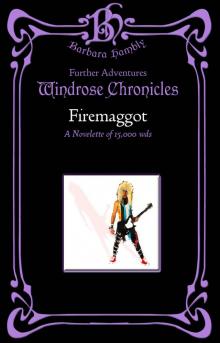 Firemaggot (Windrose Chronicles)
Firemaggot (Windrose Chronicles)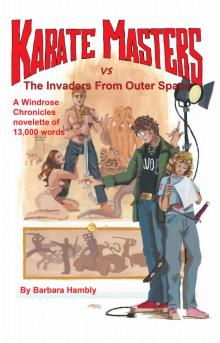 Karate Masters vs the Invaders From Outer Space (Windrose Chronicles)
Karate Masters vs the Invaders From Outer Space (Windrose Chronicles) Plus-One (Windrose Chronicles)
Plus-One (Windrose Chronicles)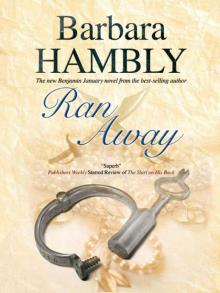 Ran Away (Benjamin January Mysteries)
Ran Away (Benjamin January Mysteries) Corridor (Windrose Chronicles)
Corridor (Windrose Chronicles)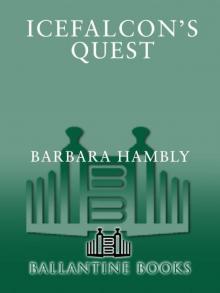 Icefalcon's Quest (Darwath)
Icefalcon's Quest (Darwath) Nanya of the Butterflies (Sun Wolf and Starhawk)
Nanya of the Butterflies (Sun Wolf and Starhawk)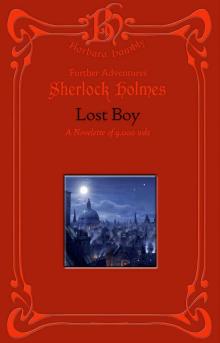 Sherlock Holmes - Adventure of the Lost Boy
Sherlock Holmes - Adventure of the Lost Boy